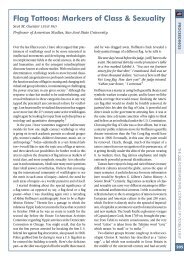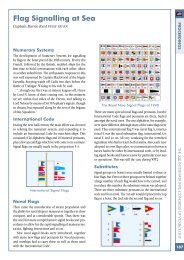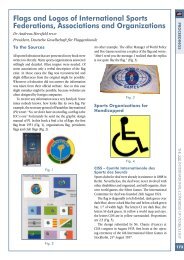The International Brigades in the Spanish War ... - The Flag Institute
The International Brigades in the Spanish War ... - The Flag Institute
The International Brigades in the Spanish War ... - The Flag Institute
You also want an ePaper? Increase the reach of your titles
YUMPU automatically turns print PDFs into web optimized ePapers that Google loves.
Thomas Pa<strong>in</strong>e (<strong>The</strong>tford, Norfolk, England, 1737-<br />
New York, 1809): Thomas Pa<strong>in</strong>e was an American<br />
Found<strong>in</strong>g Fa<strong>the</strong>r. Son of a Quaker, after a short basic<br />
education, he started to work, at first for his fa<strong>the</strong>r,<br />
later as an officer of <strong>the</strong> excise. Dur<strong>in</strong>g this occupation<br />
Thomas Pa<strong>in</strong>e was an unsuccesful man, and was twice<br />
dismissed from his post. In 1774, he met Benjam<strong>in</strong><br />
Frankl<strong>in</strong> <strong>in</strong> London, who advised him to emigrate to<br />
America, giv<strong>in</strong>g him letters of recommendation.<br />
Pa<strong>in</strong>e landed <strong>in</strong> Philadelphia on November 30, 1774.<br />
Start<strong>in</strong>g over as a publicist, he first published his African<br />
Slavery <strong>in</strong> America, <strong>in</strong> <strong>the</strong> spr<strong>in</strong>g of 1775, criticis<strong>in</strong>g<br />
slavery <strong>in</strong> America as be<strong>in</strong>g unjust and <strong>in</strong>humane.<br />
On arriv<strong>in</strong>g <strong>in</strong> Philadelphia, Pa<strong>in</strong>e had sensed <strong>the</strong> rise<br />
of tension, and <strong>the</strong> spirit of rebellion, that had steadily<br />
mounted <strong>in</strong> <strong>the</strong> Colonies after <strong>the</strong> Boston Teaparty.<br />
In Pa<strong>in</strong>e’s view <strong>the</strong> Colonies had all <strong>the</strong> right to revolt<br />
aga<strong>in</strong>st a government, for him <strong>the</strong>re was no reason for<br />
<strong>the</strong> Colonies to stay dependent on England. On January<br />
10, 1776 Pa<strong>in</strong>e formulated his ideas on American<br />
<strong>in</strong>dependence <strong>in</strong> his pamphlet Common Sense. Due<br />
to <strong>the</strong> many copies sold (500,000) Pa<strong>in</strong>e’s <strong>in</strong>fluence<br />
on <strong>the</strong> Declaration of Independence of July 4, 1776<br />
is em<strong>in</strong>ent. Dur<strong>in</strong>g <strong>the</strong> <strong>War</strong> of Independence Pa<strong>in</strong>e<br />
volunteered <strong>in</strong> <strong>the</strong> Cont<strong>in</strong>ental Army. In 1777 he<br />
became Secretary of <strong>the</strong> Committee of Foreign Affairs<br />
<strong>in</strong> Congress, but already <strong>in</strong> 1779 he was forced to<br />
resign because he had disclosed secret <strong>in</strong>formation.<br />
In <strong>the</strong> follow<strong>in</strong>g n<strong>in</strong>e years he worked as a clerk at <strong>the</strong><br />
Pennsylvania Assembly and published several writ<strong>in</strong>gs.<br />
In 1787 Thomas Pa<strong>in</strong>e left for England, <strong>in</strong>itially to raise<br />
funds for <strong>the</strong> build<strong>in</strong>g of a bridge he had designed, but<br />
after <strong>the</strong> outbreak of <strong>the</strong> French Revolution he became<br />
deeply <strong>in</strong>volved <strong>in</strong> it. Though a true republicanist, he<br />
was imprisoned <strong>in</strong> 1793 under Robespierre, because<br />
he had voted aga<strong>in</strong>st <strong>the</strong> execution of <strong>the</strong> dethroned<br />
K<strong>in</strong>g Louis XVI.<br />
After his release he stayed <strong>in</strong> France until 1802,<br />
when he sailed back to America, after an <strong>in</strong>vitation<br />
by Thomas Jefferson who had met him before when<br />
he was m<strong>in</strong>ister <strong>in</strong> Paris and who admired him. Back<br />
<strong>in</strong> <strong>the</strong> United States he learned that he was seen as<br />
a great <strong>in</strong>fidel, or simply forgotten for what he had<br />
done for America.<br />
Patrik Henry (1736-1799): He was a prom<strong>in</strong>ent<br />
figure dur<strong>in</strong>g <strong>the</strong> era of <strong>the</strong> American Revolution.<br />
In <strong>the</strong> op<strong>in</strong>ion of most historians (and most of his<br />
contemporaries), he was one of, if not <strong>the</strong> most radical<br />
politician of <strong>the</strong> period. Tra<strong>in</strong>ed as an attorney,<br />
and noted for his heated oratorical skills. Henry was<br />
elected to <strong>the</strong> House of Burgesses (legislative body<br />
of <strong>the</strong> Virg<strong>in</strong>ia colony) <strong>in</strong> 1765. That same year, he<br />
proposed <strong>the</strong> Virg<strong>in</strong>ia Stamp Act Resolutions. It was<br />
possibly <strong>the</strong> most anti-British (many called it “treasonous”)<br />
American political action to that po<strong>in</strong>t, and<br />
some credit <strong>the</strong> Resolutions with be<strong>in</strong>g one of <strong>the</strong><br />
ma<strong>in</strong> catalysts of <strong>the</strong> Revolution. Henry is perhaps<br />
best known for <strong>the</strong> clos<strong>in</strong>g words of a speech he<br />
made <strong>in</strong> <strong>the</strong> House of Burgesses on March 23, 1775,<br />
urg<strong>in</strong>g that legislature to take military action aga<strong>in</strong>st<br />
<strong>the</strong> encroach<strong>in</strong>g British military force:<br />
Is life so dear, or peace so sweet, as to be purchased<br />
at <strong>the</strong> price of cha<strong>in</strong>s and slavery? Forbid it, Almighty<br />
God! I know not what course o<strong>the</strong>rs may take; but as<br />
for me, give me liberty or give me death!”<br />
Dur<strong>in</strong>g <strong>the</strong> Revolution, Henry led a military force <strong>in</strong><br />
defense of Virg<strong>in</strong>ia, chiefly <strong>in</strong> defense of some disputed<br />
gunpowder coveted by <strong>the</strong> British.<br />
After <strong>the</strong> Revolution, Henry was an outspoken critic of<br />
<strong>the</strong> Constitution and urged aga<strong>in</strong>st its adoption, argu<strong>in</strong>g<br />
it gave <strong>the</strong> federal government too much power.<br />
He served as <strong>the</strong> first Governor of Virg<strong>in</strong>ia, from<br />
1776-79, and aga<strong>in</strong> from 1784-86. He died at Red Hill<br />
Plantation, Virg<strong>in</strong>ia.<br />
Nº 21. - Gal<strong>in</strong>do (14/3/1937 –<br />
10/11/1937)<br />
<strong>Spanish</strong> people.<br />
Nº 24. - Español (5/4/1937 – 23/9/1938)<br />
Hispano-Americans.<br />
Rakosi (12/4/1937 – 22/9/1938)<br />
Hungarians and Czechs, Tartarians from Turkestan,<br />
Ukra<strong>in</strong>ians and Poles.<br />
Italoespañol (2nd of <strong>the</strong> XII IB) (1/5/1937<br />
– 25/9/1938)<br />
Italians.<br />
Italoespañol [Figlio] (3rd of <strong>the</strong> XII IB)<br />
(1/5/1937 – 25/9/1938)<br />
Italians.<br />
Hans Beimler (May 1937 – 23/10/1938)<br />
People from Austria, Switzerland and Scand<strong>in</strong>avia.<br />
PROCEEDINGS<br />
153






